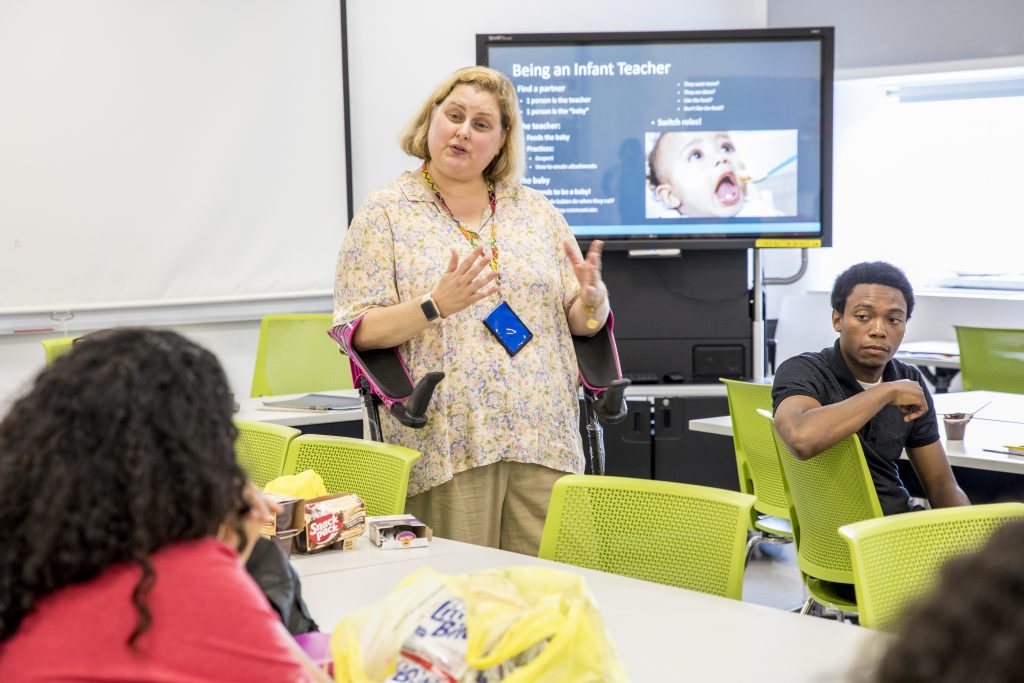This past July marked the 30th anniversary of the American with Disabilities Act (ADA). The ADA opened many doors for individuals with disabilities, with the rights to equal opportunities in education including higher education and employment. When the early childhood field thinks about the ADA, we most often think about the accommodations and services we offer to children and families. It is important, however, to remember that your program’s employees can also be beneficiaries of the ADA. If you hire 15 or more employees, you are required to comply with the ADA and Labor Law requirements regarding individuals with disabilities.
The Institute’s Early Childhood Career Development Center (ECCDC) supports all individuals seeking employment in early childhood. When clients disclose disabilities, it is our job to support them in the employment search. Individuals are not required to disclose their disability prior to an interview or hire; some disabilities are hidden and not easily noticed. All individuals with a disability have the same rights to employment as any other able-bodied individual. Our goal is to provide information and to coach individuals into a successful job opportunity.
A Question of Equity
Early childhood centers and schools regularly evaluate their programs through a lens of equity and diversity. Classroom teachers ensure that children see images of individuals with disabilities through books, play figurines, and posters. Teachers learn about differentiated instruction and universal design techniques to ensure students have equity in a learning environment. The recent Early Childhood Workforce Index (2018), published by Center for the Study of Child Care Employment, highlights structural inequalities in the workforce including those based on gender, class, and linguistic and cultural diversity. We do not currently have data about how many childcare providers have a disability or what type of disability.
We now have an entire generation of the workforce that has benefited from the ADA and are now employable. The next step is to promote a culture of acceptance, understanding, and empowerment. Encouraging self-disclosure and capturing data will inform employment policy and practice in early childhood settings that support individuals with disabilities. The disability community is the only minority group one can join or move in and out of at any time in life. One in five individuals will be disabled or age into disability in their lifetime. Programs need to evaluate how they recruit, hire, and retain individuals with disabilities and what their HR policies are in regards to reasonable accommodations for those with disabilities. All companies that are federal contractors or subcontractors must allow staff to self-identify. The self-disclosure form is an important step in the goal set by the Rehabilitation Act under the ADA in 2014, setting a target that 7% of the workforce be comprised of employees with disabilities.
Quality Resource
More than one quarter (26%) of Americans are classified as having a disability, but some do not feel welcome or comfortable in applying for work in the early childhood field. When we review job descriptions, many are tailored for classroom teachers with physical requirements that create barriers to employment. When the job descriptions are further dissected, we find that some of these “requirements” may actually be suggestions or recommendations that are not inclusive practice. Our field is experiencing a shortage of individuals in all areas of the workforce. If we are excluding 1 in 4 of the population, we are not only creating barriers for individuals with disabilities but potentially also contributing to the early childhood workforce crisis.
ECCDC advisors have worked with individuals with a variety of abilities, including processing disorders, cognitive delays, visual and hearing impairments, traumatic brain injuries and physical limitations. They all are successful individuals in the workforce, making valuable contributions to their programs and schools, as well as young children and their families. Evaluating and reimagining our hiring practices, job descriptions and willingness to make accommodations will allow a new opportunity to expand the workforce. We must show young children that individuals with disabilities are important members of society not just through books and images, but also by hiring individuals with disabilities in classrooms.
Barriers and Accommodations
As an equal opportunity employer, it is important to consider and include individuals with disabilities. Early childhood owners and directors are required to comply with childcare regulations with limited budgets. This is possible! Some employers believe that accommodations will be expensive, unfair to the rest of the staff, or disruptive. The ADA indicates accommodations must be “reasonable.” Studies show that most accommodations costs are minimal, with an average cost of $500. Less than 14% of individuals with disabilities actually seek accommodations.
Just as we provide accommodations for a child in our classroom to create an equitable learning environment for success, we can do the same when looking at the working environment. Some individuals with disabilities will have a job coach. A job coach is an individual that is not hired or employed by your school. This individual is on site to support your employee, their colleagues and you as their employer to navigate accommodations and answer questions to support success in the work environment. A great tool for hiring managers who hire and employ individuals with disabilities is the Job Accommodation Network (JAN).
Hiring Practices
When hiring qualified staff for your program, all candidates should meet the minimum qualifications. Equal opportunity does not mean that an individual who is not qualified but has a disability is the right candidate for the position. Standardized questions are essential. You should never ask an individual about his or her disability if they choose not to disclose it, nor can you ask someone about an invisible disability. All candidates can be asked a question about how they supervise children. This will provide the hiring manager a good sense of the candidate’s practice and ability. All candidates can be asked to describe their communication strategies with families and colleagues. Again, this should be a typical question for all candidates for the hiring manager to learn about the candidate’s ability and skills in the role. In NYS you are allowed to indicate that all offers of hire are contingent on a physical that is required by the licensing agency.
Thirty years later, the ADA and leaders in the disability community still strive to close the employment gap and make every workplace inclusive. The ECCDC believes in fair employment and economic empowerment and equity for all, including those with disabilities. Our goal is to help you do the same.
Claudine Campanelli is the Institute’s Director of Career Development and Higher Education. She has over twenty years in early childhood and organization management and holds an MBA and MA in HR. She is also a founding board member of All Wheels up, Inc. the only non-profit research organization advocating and researching the feasibility of a wheelchair spot of commercial aircraft to enable all individuals in a wheelchair to travel safely and with dignity.



